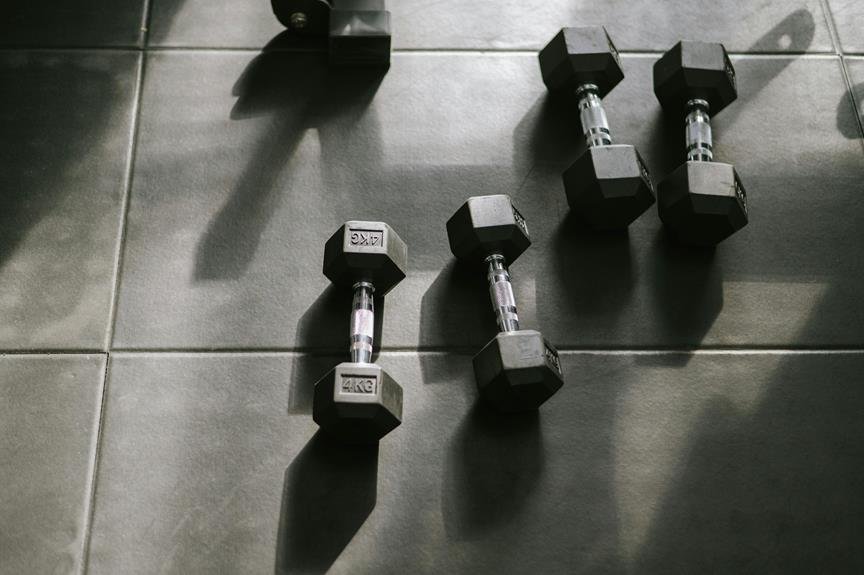Breaking Down Common Fitness Myths and Misconceptions
When it comes to fitness, separating fact from fiction can be a daunting task. You've likely heard conflicting information about spot reduction – does it really work? Understanding the nuances of common fitness myths and misconceptions can be the key to achieving your goals effectively.
From the role of carbs in weight loss to the necessity of supplements, let's unravel the truth behind these prevalent beliefs and make informed decisions about your fitness journey.
Spot Reduction: Myth or Reality?
Despite what some may claim, spot reduction is a fitness myth that continues to deceive many individuals seeking to target specific areas for fat loss. When you perform exercises that target a particular body part, such as crunches for the abs or tricep dips for the arms, the fat in that area doesn't magically disappear.
Fat loss occurs throughout your body as a whole, not just in the areas you're working out. This means that doing hundreds of sit-ups won't solely burn belly fat; instead, it helps to strengthen and tone the muscles underneath. To effectively reduce fat in specific areas, you need to focus on overall weight loss through a combination of proper nutrition, cardiovascular exercise, and strength training.
The Truth About Carbs and Weight Loss
Carbs play a crucial role in your weight loss journey; understanding their impact is essential for achieving your fitness goals. Contrary to popular belief, not all carbohydrates are bad for you. Complex carbs like whole grains, fruits, and vegetables provide essential nutrients and fiber that support your overall health and weight loss efforts. These carbs digest more slowly, keeping you fuller for longer periods and helping to control your appetite.
It's a common misconception that cutting out all carbs is the key to shedding pounds. In reality, severely restricting carbs can lead to nutrient deficiencies and leave you feeling fatigued. The key lies in choosing the right kinds of carbs and moderating your intake based on your activity level and weight loss goals.
When it comes to carbs and weight loss, the quality and quantity you consume matter most. Opt for whole, unprocessed carbs in appropriate portions to fuel your body effectively while promoting weight loss. Remember, balance is key in any successful weight loss journey.
Muscle Confusion for Better Gains?
To enhance your workout results, some fitness enthusiasts advocate the concept of muscle confusion for achieving better gains. The idea behind muscle confusion is to continuously change your exercise routine to prevent your muscles from adapting to the same movements, ultimately leading to better muscle growth and overall fitness improvements. This approach involves varying factors like exercise selection, sets, reps, and intensity levels to keep challenging your body in new ways.
However, while muscle confusion can be beneficial in some cases, it's essential to remember that consistency is also key to making progress. Constantly switching up your routine without allowing your body to adapt to specific exercises may hinder your ability to track progress accurately. Additionally, focusing on proper form, adequate rest, and nutrition are equally vital components of any successful fitness regimen.
Cardio Vs. Weight Training for Fat Loss
When considering fat loss, it's vital to understand the differences between cardio and weight training to make informed decisions about your workout routine. Cardio exercises, like running or cycling, are great for burning calories during the workout. They primarily focus on increasing your heart rate and improving cardiovascular health. However, the calorie burn stops shortly after the workout ends.
On the other hand, weight training helps build muscle mass, which can boost your metabolism even at rest. Muscles burn more calories than fat, so the more muscle you have, the more calories you burn throughout the day.
Incorporating both cardio and weight training into your routine is often the most effective approach for fat loss. Cardio can help you create a calorie deficit, while weight training can help you maintain or increase muscle mass. Remember, the key to fat loss is a combination of a balanced diet, regular exercise, and consistency. So, mix up your workouts and find what works best for your body to achieve your fat loss goals efficiently.
Are Supplements Really Necessary?
Supplements play a role in enhancing your fitness journey, but they aren't essential for everyone. While some supplements can be beneficial in certain situations, such as filling nutrient gaps or supporting specific fitness goals, a well-balanced diet should be your primary focus.
Before considering supplements, it's important to evaluate your current diet and fitness routine. If you're already meeting your nutritional needs through whole foods and leading a healthy lifestyle, additional supplements may not provide significant benefits. However, if you have specific deficiencies or struggle to get certain nutrients from food alone, supplements could be helpful.
Keep in mind that supplements aren't a quick fix and should complement, not replace, a balanced diet. Always consult with a healthcare provider or a nutritionist before starting any new supplement regimen to ensure it aligns with your individual needs and goals. Remember, consistency in your diet, exercise, and overall lifestyle habits are key components of a successful fitness journey, with or without supplements.
Conclusion
So, now that you know the truth about common fitness myths and misconceptions, you can make more informed decisions about your health and fitness journey.
Remember, spot reduction is a myth, carbs aren't the enemy, muscle confusion may not be necessary, both cardio and weight training are important for fat loss, and supplements aren't always necessary.
Keep educating yourself and making smart choices to reach your fitness goals.





